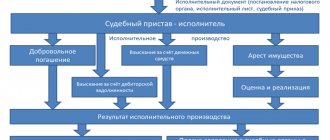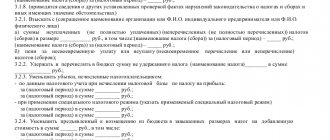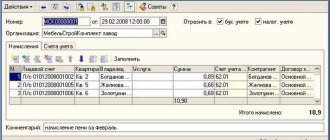N. N. Kataeva author of the article, leading expert of the Main Book magazine
It happens that in order to participate in a competition for a government order, obtain a loan from a bank, or confirm to a counterparty that they are “clean” before concluding an agreement, an organization or entrepreneur requires a certificate of absence of tax arrears.
But upon receiving it, a debt is suddenly discovered that they had already forgotten about. How to write off such tax debt if you do not plan to pay it off?
What is the result of tax arrears?
Tax arrears can be identified by tax inspectors as part of tax control activities - a desk or on-site tax audit. The fact of identified tax arrears is reflected in the decisions made by the tax authority based on the results of tax audits. Accordingly, the date of detection of arrears is the date of the decision made based on the results of a particular audit. Tax inspectors can identify tax arrears from a taxpayer even outside the framework of tax control measures. For example, inspectors can compare the tax amounts indicated by the taxpayer in the declaration. In such cases, the day the tax arrears are identified will be the day following the day the tax payment is due (a kind of advance payment), and if the taxpayer submits a declaration (that is, the calculation of the advance payment) in violation of the established deadlines, the day the arrears are identified will be the day following after the day of submission of such a declaration. Also, tax arrears can be identified by the taxpayer himself if he discovers that he incorrectly indicated in the payment order the treasury account number and the name of the recipient's bank, because if such an error is made, the tax paid by the taxpayer will not go to the budget, but will remain stuck as an unexplained payment. Also, arrears arise if the taxpayer makes an error in calculating the taxable base and the amount of tax payable to the budget. The taxpayer can determine the date of occurrence of the arrears based on the information reflected in his personal account maintained by the tax authority, since they are reflected on it. As we noted above, a tax arrears can also be formed as a result of an excessively refunded amount of tax; in this case, the date of detection of the arrears will be the date the taxpayer actually receives funds upon tax refund, or the date a decision is made to set off the amount declared by the taxpayer for reimbursement upon tax offset (see paragraph 4, clause 8, article 101 of the Tax Code of the Russian Federation).
General period for collecting tax arrears from legal entities
If the tax authority has identified a tax arrears, it must notify the taxpayer-debtor about this no later than three months from the date of discovery of the arrears. If the arrears were identified as a result of a tax audit, the request for payment of the tax arrears must be sent to the taxpayer-debtor no later than ten days from the moment the arrears were identified. The Tax Code of the Russian Federation provides for a minimum period for collecting debts on taxes, fees, penalties, and penalties after the taxpayer actually receives a request from the tax authority. It is equal to eight working days, but it can be more. At the same time, the maximum term is not established by law at all today. The taxpayer is obliged to fulfill the obligation to pay the arrears within the time period established in the request (clause 6 of article 6.1, paragraph 4 of clause 4 of article 69 of the Tax Code of the Russian Federation).
In addition to the above, the requirement to pay arrears of taxes and accrued penalties must contain the following mandatory requirements:
- amount of arrears;
- deadlines for repayment of arrears;
- the amount of penalties accrued on the amount of arrears;
- measures to collect arrears.
During a tax audit, when tax arrears are identified, the taxpayer must be sent a request to pay the identified arrears within twenty business days from the date of entry into force of the tax authority’s decision based on the results of the tax audit. If the arrears were identified outside the framework of tax control measures, the period for submitting a claim depends on the total amount of debt (including debt for penalties and fines):
- if the debt is 500 rubles or more, the demand is sent within three months from the date of discovery of the arrears;
- less than the specified amount - within one year from the date of discovery of the arrears.
Tax authorities begin forced collection of arrears only in cases where the taxpayer refuses to voluntarily pay it. Forced collection of tax arrears occurs by collecting missing amounts of taxes from the current accounts of taxpayers of legal entities, including forced collection of electronic money. Moreover, the process of forced collection (writing off) of tax debts occurs without the tax authorities applying to the courts.
Also, forced collection of tax debts is carried out through the sale of property of a legal entity. It should be noted that the general limitation period established by the legislation of the Russian Federation for civil legal relations has nothing to do with tax legal relations (see clause 3 of Article 2 of the Civil Code of the Russian Federation). There is no independent rule, similar to the rule on the general limitation periods provided for by the Civil Code of the Russian Federation, in the Tax Code. However, the general statute of limitations for collecting tax arrears is three years. As noted above, tax obligations in our country are truly unlimited. The Tax Code of the Russian Federation provides for deadlines by which, if missed, the debt may be considered uncollectible. Property taxes, such as transport tax, real estate tax, etc., can be assessed by the tax authority only for the last three years, according to the general rules of limitation.
How to reflect the write-off of tax debt in accounting
The debt write-off must be reflected in accounting as of the date the Federal Tax Service makes its decision. It is not necessary to include written-off bad accounts payable for taxes, penalties and fines in income for calculating income tax (subclause 21, clause 1, article 251 of the Tax Code of the Russian Federation).
But there is an exception. When writing off tax arrears, which were previously taken into account in “profitable” expenses when accruing, they will have to be taken into account as part of non-operating income in the write-off period as income from previous years identified in the current period (clause 33 of Article 270 of the Tax Code of the Russian Federation). This is, for example, arrears on property tax, transport or land tax, and insurance premiums. An updated income tax return for previous periods is not required.
Is it necessary to use the simplified tax system to include in non-operating income tax arrears written off by decision of the tax authorities, which during the period of application of the general taxation system were taken into account in “profitable” expenses when accrued? We asked this question to a specialist. And we received this answer.
Time limits for collection of tax arrears by tax authorities
If a tax arrear is detected, the tax authority issues a demand to the debtor to pay taxes, penalties, fines, and interest within the following terms:
- no later than twenty working days from the date of entry into force of the decision made by the tax authority based on the results of the audit (as part of the audit - see paragraph 6 of Article 6.1, paragraphs 2, 3 of Article 70, paragraph 1 of Article 87, paragraph 7, 9, Article 101 of the Tax Code of the Russian Federation);
- the deadline for sending a claim depends on the amount of debt (outside the scope of the audit - see paragraphs 1, 3 of Article 70, paragraph 10 of Article 101.4 of the Tax Code of the Russian Federation).
A demand for tax payment in accordance with paragraph 6 of Article 69 of the Tax Code of the Russian Federation can be served in three ways:
- by handing it over to the head of the legal entity or legal representative in person against signature;
- by sending by registered mail with return receipt requested;
- via telecommunication channels in electronic form.
The request for payment of tax arrears is always sent to the address of the legal entity indicated in the Unified State Register of Legal Entities (see clause 5 of Article 31 of the Tax Code of the Russian Federation). As a general rule, a request from a tax authority sent by mail is considered received by the taxpayer on the sixth working day from the date of sending (see clause 6 of Article 69 and clause 6 of Article 6.1 of the Tax Code of the Russian Federation). The procedure for submitting a claim electronically via telecommunication channels was approved by Order of the Federal Tax Service of Russia dated December 9, 2010 No. ММВ-7-8/700. If an electronic request is sent via telecommunication channels, it is considered received by the taxpayer from the moment he sends an electronic receipt of the document to the tax office. If such a receipt is available, the tax authority no longer duplicates the request in paper form by registered mail. Therefore, if the tax inspectorate, when sending the request electronically, does not receive a receipt from the taxpayer about acceptance, then the request on paper will be sent by mail in accordance with the general procedure (see paragraphs 5, 12 and 19 of the Procedure approved by order of the Federal Tax Service of Russia dated December 9, 2010 No. ММВ-7-8/700).
If the taxpayer debtor does not comply with the tax authority’s demand for payment of tax arrears, penalties, fines, the tax authority no later than two months from the date of expiration of the payment period specified in the request, makes a decision to collect tax debts from the bank account the taxpayer has with the debtor (clause 3 Article 46 of the Tax Code of the Russian Federation). No later than six months after the end of the deadline for fulfilling the requirement to pay arrears, penalties, fines, the tax authority has the right to submit an application to the arbitration court with an application to collect tax arrears from the taxpayer, but only in cases expressly mentioned in subparagraph. 1-4 p. 2 tbsp. 45 of the Tax Code of the Russian Federation. According to sub. 2 p. 2 art. 45 of the Tax Code of the Russian Federation, in this case, the tax authorities have the right to apply to the arbitration court only if the arrears are identified as part of a tax audit and have been registered with the legal entity for more than three months. Indisputable collection of arrears in such situations is impossible. In terms of collection of tax debts from members of a consolidated group of taxpayers, the deadline for filing a claim is, as a rule, extended to six months after the expiration of the six-month period for indisputable collection of debts from the bank accounts of this category of persons (see subparagraph 5, paragraph 11, article 46 of the Tax Code Code of the Russian Federation). In practice, the tax inspectorate also misses the deadline for filing a statement of claim in court; if there is evidence of a valid reason for missing the deadline, the court will reinstate it (see paragraph 1, paragraph 3, subparagraph 5, paragraph 11, article 46 of the Tax Code of the Russian Federation, article 117 Arbitration Procedural Code of the Russian Federation).
If it is impossible to collect tax debts from a legal entity, the tax authority:
- makes a decision on the collection of tax arrears at the expense of the taxpayer’s property no later than one year after the deadline for fulfilling the requirement to pay the debt (clause 7 of article 46, clause 1 of article 47 of the Tax Code of the Russian Federation);
- applies to the arbitration court with an application to collect tax arrears from the taxpayer within a period of one to two years after the expiration of the deadline for fulfilling the demand.
Time limit for collecting arrears in court
Debt collection through compulsory judicial procedure occurs, as a rule, if the taxpayer and debtor refuses to voluntarily repay it. But according to the general rules of legal proceedings, the creditor does not have the right to take independent measures to force the collection of debt from his debtor. The same is true in cases where a tax authority collects arrears of taxes from a debtor taxpayer, because in these respects the tax authority is a creditor, and the taxpayer is a debtor. That is why creditors have the right to collect debt only through court, but the creditor does not have the right to go to court right away. Before going to court, the creditor needs to try to resolve the existing dispute out of court. The same thing happens when collecting arrears from the taxpayer. First of all, the tax authority must send the taxpayer a demand for payment of arrears and penalties. We indicated above about the rules for drawing up, the procedure for sending and delivering a request for payment of tax arrears by the tax authority.
The only thing that should be noted once again regarding the judicial procedure for collecting tax arrears is that the amount of tax arrears specified in such a request must be repaid by the taxpayer within ten days from the date of its receipt. If the taxpayer does not pay off the tax debt, then the tax authority applies to the arbitration court for forced collection. As after considering any property claim, after considering the claim of the tax authority for the collection of tax arrears, the court issues a writ of execution. Further, the process of its execution looks standard: funds are written off from the taxpayer’s bank accounts in the amount of the amount of tax debt, the taxpayer’s property is seized, and the official is banned from traveling abroad.
If the taxpayer does not pay the arrears for a long time, it may be recognized as uncollectible, and then simply canceled like any uncollectible debt. Even if the general statute of limitations for tax arrears against the taxpayer has not expired, the tax authority does not have the right to oblige the taxpayer to repay the arrears, despite the fact that it continues to be registered with him.
According to sub. 1-4.1 clause 1 art. 59 of the Tax Code of the Russian Federation, tax arrears (tax debts) can be recognized as hopeless in the following cases:
- liquidation of a legal entity;
- declaring a legal entity bankrupt;
- the presence of a court decision, according to which the tax authorities do not have the right to demand payment of arrears of taxes, penalties from the debtor;
- the bailiff issuing a resolution to complete the proceedings on the writ of execution with the return of such a document to the claimant (clauses 3, 4, part 1, article 46 of the Federal Law of 02.10.2007 No. 229-FZ “On Enforcement Proceedings”), provided that This debt arose more than 5 years ago, in the following cases:
- if the amount of debt is equal to or lower than the amount of claims against the debtor established by the legislation of the Russian Federation on insolvency (bankruptcy) for initiating bankruptcy proceedings;
- the court returns the application for declaring the debtor bankrupt or terminates the bankruptcy proceedings due to the lack of funds necessary to compensate for legal costs for the procedures applied in the bankruptcy case.
The Tax Code of the Russian Federation does not establish a statute of limitations, while the periods provided for by the Civil Code of the Russian Federation are not applicable to tax arrears. Hence, many people have a completely reasonable question: on what basis is the period for collecting tax arrears determined? In turn, the period for collecting arrears in court is established by tax legislation and is three years. This is what concerns the statute of limitations for collecting tax arrears in principle, but the collection itself occurs within nine months on average, from the moment the organization goes to court and two years, in the case of collecting tax arrears through the seizure of property. It is worth noting that collecting tax arrears through the court is a rather lengthy process. However, if the taxpayer has incurred a debt to the budget (tax authorities, pension fund, insurance companies), then the legal process, as a rule, occurs much faster.
In court, arrears are recovered from companies that:
- the amount of tax debt over 5,000,000 rubles (see subparagraph 1, paragraph 2, article 45 of the Tax Code of the Russian Federation);
- there was a requalification of the transaction, status or nature of the company’s activities (see subparagraph 3, paragraph 2, article 45 of the Tax Code of the Russian Federation);
- the correct application of prices in transactions between related parties was checked (see subparagraph 4, paragraph 2, article 45 of the Tax Code of the Russian Federation).
Also, through the court, arrears can be recovered from those companies that are interdependent in relation to the companies for which these tax arrears arose initially, and only arose as a result of tax audits and the company’s failure to pay such tax arrears within three months. The grounds for collecting arrears from interdependent organizations are defined in subparagraph 2 of paragraph 2 of Article 45 of the Tax Code of the Russian Federation and are possible in the following cases:
- if the bank accounts of interdependent companies receive proceeds for goods, works or services sold by taxpayer companies that have arrears at the time of a particular transaction, or for which it initially arose;
- if the company that initially had a tax arrears, having learned about the appointment of an on-site tax audit or a desk tax audit, transferred funds or other property to an interdependent company in order to complicate the collection of the tax arrears or make it impossible.
To conclude the topic under consideration, we can summarize that tax arrears are debt, the amount of contributions, deductions, etc. not made by the company by the taxpayer. The establishment of the fact of arrears within the framework of tax audits occurs as a result of the identification of errors in payment documents and by the taxpayer himself - the head of the legal entity. Tax arrears, like any debt, are subject to recovery through the court. The actual collection of funds occurs by debiting funds from the bank accounts of the debtor's legal entity.
The payer is not familiar with all the audit materials.
Clause 3.1 of Art. 100 of the Tax Code of the Russian Federation establishes that the tax authority must attach to the tax audit report documents confirming facts of violation of the legislation on taxes and fees identified during control activities. In this case, documents received from the person being inspected are not attached to the act.
From the legal position of the Presidium of the Supreme Arbitration Court, set out in Resolution No. 15726/10 dated November 8, 2011, it follows: the taxpayer’s right to timely familiarization with all materials
received by inspectors as part of their inspections is his inalienable
right
. However, in order to recognize the fact of a violation of the essential conditions of the tax audit procedure, resulting in the payer’s inability to familiarize himself with these materials and submit appropriate objections, it is not enough to indicate that he has such a right. Therefore, before canceling a decision on formal grounds, you should find out what documents and information are being discussed and how such information affects the conclusions of the tax authority recorded in the tax audit report.
In other words, the inspectors’ violation of clause 3.1 of Art. 101 of the Tax Code of the Russian Federation does not yet mean that their decision will be declared invalid by the court on procedural grounds. In each specific case, the arbitrators examine the case materials and give them an appropriate assessment.
Let's give an example - Resolution of the FAS VSO dated January 30, 2014 No. A78-1414/2013. The taxpayer challenged the inspectorate's decision in court, including on formal grounds. According to the claim, the tax authority did not attach all the documents named in this act to the on-site inspection report: there were no copies of statements of transactions on the accounts of counterparties, inspection reports, or information from the information resources of the tax service. This, in the opinion of the person being inspected, violated his rights to protect his interests.
The judicial authorities recognized the taxpayer's arguments as justified. The judges decided: these circumstances deprived him of the opportunity to verify the authenticity of these documents, give a legal assessment of the admissibility and relevance of the evidence obtained confirming his guilt in committing a tax offense, and, accordingly, present his explanations and objections on the merits of the violations established by the inspection.
Supporting the taxpayer, the arbitrators noted: not only the full reflection of the identified violations in the tax audit report, but also the subsequent study and drawing up of objections by the taxpayer to it are a prerequisite
implementation by the tax authority of further procedures for holding the taxpayer accountable. Therefore, the inspection’s failure to comply with the requirements of clause 3.1 of Art. 100 of the Tax Code of the Russian Federation influenced the objectivity of the consideration of audit materials and deprived the organization of the opportunity to fully exercise the right to protect interests. Consequently, the violation committed must be qualified as significant and constitute a basis for invalidating the inspection decision.
Similar conclusions were made in the resolutions of the Federal Antimonopoly Service of the North Caucasus Region dated 02/13/2014 No. A53-5717/2013, No. A53-28709/2012 dated 07/08/2013, and No. A78-4232/2012 of the FAS VSO dated 02/15/2013.
The arbitrators of the FAS ZSO (Resolution No. A70-1252/2013 dated February 27, 2014) also came to the conclusion that the inspectorate committed procedural violations in the form of failure to send to the taxpayer all the necessary documents (including the protocol of interrogation of a witness). However, the judges found the following facts:
- the company has received an on-site inspection report and objections have been submitted to it;
- excerpts from the controversial protocol of the interrogation of the witness are given in the report;
- taxpayer representatives are familiar with the documents collected by inspectors during tax control activities;
- the society is provided with the opportunity to participate in the process of reviewing tax audit materials;
- the taxpayer did not indicate what specific rights and legitimate interests were violated on the merits when the inspectorate did not send the controversial interrogation protocol and how this violation affected his right to challenge the conclusions of the tax authority on the merits.
As a result, the arbitrators did not recognize the violation as significant enough to cancel the inspection decision for the reason specified by the taxpayer.
The judges took a similar position when making decisions of the FAS ZSO dated September 25, 2013 No. A27-19122/2012, FAS TsO dated March 18, 2014 No. A35-2512/2013.
Interesting, in our opinion, is the situation considered by the arbitrators of the FAS MO (Resolution No. F05-532/2014 dated February 20, 2014). The taxpayer considered that the inspection violated the audit procedure by not providing him with copies of requests and responses from counterparty banks. This did not allow the organization to find out whether these documents were received directly as part of the on-site inspection. The taxpayer believes that, by virtue of clause 14 of Art. 101 of the Tax Code of the Russian Federation, these circumstances are grounds for canceling the inspection decision.
The court did not agree with the taxpayer. The arbitrators found that, as attachments to the inspection report, the company was given copies of bank statements of its counterparties. According to the judges, the requests sent by the inspectors to the bank for the presentation of these statements do not contain facts indicating a violation of tax legislation by the taxpayer. Therefore, they should not be included in the appendices to the inspection report. Consequently, there are no violations of the audit procedure on the part of the tax authority.








